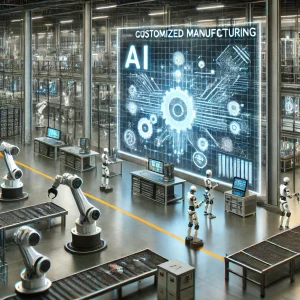AI-Driven Customized Manufacturing Factory: Overview and Frontier Technologies
In today’s fast-paced world, manufacturers are under pressure to adapt quickly to customer demands while ensuring high efficiency and quality. This is where AI-driven customized manufacturing factories come into play. These factories use cutting-edge technologies to create tailored solutions, making the manufacturing process more flexible, efficient, and cost-effective. Let’s explore how these factories work and the frontier technologies that are driving them forward.

What Is an AI-Driven Customized Manufacturing Factory?
An AI-driven customized manufacturing factory leverages artificial intelligence (AI) and advanced technologies to streamline and personalize production processes. Unlike traditional factories with fixed production lines, these facilities can adapt quickly to varying requirements. AI optimizes workflows, predicts maintenance needs, and enhances product quality. Additionally, the application technology of cloud manufacturing for aerospace complex products plays a key role in ensuring smooth operations and minimizing financial risks, such as preventing manufacturer chargebacks—essential strategies for business success. This combination enables businesses to offer highly personalized products while maintaining exceptional operational efficiency.
The Role of AI in Manufacturing
AI plays a crucial role in revolutionizing manufacturing by enabling machines to “learn” from data. This process allows factories to be more responsive to changing market conditions and customer preferences. AI can automate tasks such as:
- Predictive Maintenance: AI systems can predict when a machine is likely to break down, allowing factories to perform maintenance before a failure occurs. This reduces downtime and saves costs.
- Process Optimization: AI analyzes vast amounts of data from the production floor to optimize workflows, reduce waste, and improve the overall efficiency of manufacturing processes.
- Personalized Production: By analyzing consumer data, AI can help manufacturers create products that are specifically tailored to individual customer needs. This includes customizing features, design, or functionality in real-time.
- Quality Control: AI can continuously monitor the quality of the products being produced, catching defects early in the process and ensuring that only high-quality goods are delivered to the market.
Frontier Technologies in AI-Driven Manufacturing
Several frontier technologies are contributing to the rise of AI-driven customized manufacturing factories. These technologies work together to provide the flexibility, speed, and accuracy required in today’s competitive manufacturing landscape.
1. Internet of Things (IoT)
IoT connects machines, sensors, and devices in a factory, allowing them to communicate with each other. This interconnection provides real-time data, enabling manufacturers to monitor and control production processes remotely. With IoT, manufacturers can gain insights into equipment performance, supply chain issues, and even energy usage.
2. Machine Learning (ML)
Machine learning, a subset of AI, enables systems to automatically improve by analyzing past data and recognizing patterns. In manufacturing, ML algorithms can be used to forecast demand, optimize production schedules, and predict maintenance needs, making the entire process more efficient.
3. Robotic Process Automation (RPA)
Robotic Process Automation involves using robots to perform repetitive, mundane tasks. These robots can work alongside human employees, increasing the speed and accuracy of manufacturing processes. By automating tasks such as assembly, packaging, and testing, manufacturers can reduce human error and improve overall production quality.
4. Digital Twin Technology
Digital twins are virtual replicas of physical assets. In manufacturing, these digital models can simulate the behavior of machines, equipment, and entire production lines. By using digital twins, manufacturers can test changes, predict outcomes, and avoid costly mistakes before implementing them in the real world.
5. 3D Printing
3D printing has revolutionized custom manufacturing. With this technology, manufacturers can create parts and products layer by layer, allowing for high precision and customization. AI can enhance 3D printing by optimizing the design and production process, resulting in faster production times and reduced waste.
Benefits of AI-Driven Customized Manufacturing
Here are some of the key benefits:
- Improved Flexibility: These factories can quickly adapt to new customer demands, production requirements, and market changes.
- Enhanced Efficiency: AI optimizes production schedules, reduces downtime, and ensures the most efficient use of resources.
- Higher Quality Products: AI systems continuously monitor quality and help maintain high standards, reducing defects and increasing customer satisfaction.
- Cost Savings: Automation and predictive maintenance reduce operational costs, while customized production helps avoid waste and excess inventory.
- Better Customer Satisfaction: With AI, manufacturers can offer more personalized products, giving customers exactly what they want.
Challenges and Future Prospects
Despite the many advantages, AI-driven manufacturing is not without challenges. For instance, there is a need for significant upfront investment in AI technologies and infrastructure. Moreover, integrating AI into existing systems can be complex and may require a workforce with specialized skills. However, as AI technology continues to evolve and become more accessible, these challenges are likely to diminish.
Looking ahead, the future of AI-driven customized manufacturing is incredibly promising. With advancements in AI, machine learning, and other frontier technologies, we can expect even more intelligent, automated, and efficient manufacturing processes. These innovations will further push the boundaries of customization and help manufacturers stay competitive in a rapidly changing world.
Conclusion
AI-driven customized manufacturing is more than just a trend—it represents the future of the manufacturing industry. By integrating AI and frontier technologies, factories become more agile, efficient, and responsive to customer demands. While challenges remain, the benefits far outweigh them. As AI continues to evolve, the potential for customized, high-quality manufacturing is boundless, empowering businesses to meet the demands of a rapidly changing market and drive innovation across industries.
Do you like to read more educational content? Read our blogs at Cloudastra Technologies or contact us for business enquiry at Cloudastra Contact Us.